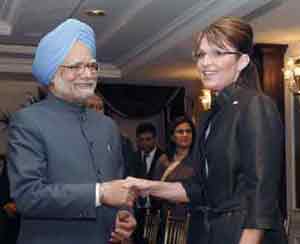Bush and Manmohan Singh to meet up as N-deal bill moves to the US House of Reps
25 September 2008
New York/Washington: The Senate version of the Bill of approval of the Indo-US nuclear deal was introduced on Thursday in the House of Representatives, coming as a positive development in the ongoing visit of Indian prime minister Dr Manmohan Singh to the United States. Congressional aides said that the introduction of the legislation in the House did not mean that the matter would be taken up immediately but suggested that perhaps it may come up for discussion on Thursday itself.
 The introduction of the Senate version of the US-India Bill in the House comes on the eve of the visit of Dr Singh to Washington for a crucial meeting with president Bush at the White House.
The introduction of the Senate version of the US-India Bill in the House comes on the eve of the visit of Dr Singh to Washington for a crucial meeting with president Bush at the White House.
The introduction of the Bill in the House of Reps comes after the House Rules Committee in an emergency session voted that certain specified measures may be considered under the suspension of the rules on the legislative day of 25 September.
The Rules Committee approved the suspension of rules on 44 measures, including the ninth on the list - "A Bill relating to India nuclear cooperation".
Indian prime minister Dr Manmohan Singh and his entourage will travel to Washington today for a Thursday afternoon meeting with US president George Bush at the White House. However, on its way to final ratification, the Indo-US nuclear deal would now appear to have run into some fresh tensions, this time from the most unexpected of quarters – the US economy.
Both the presidential hopefuls, Republican John McCain and Democrat Barack Obama are due to meet president Bush in the morning before Dr Singh arrives, in a move aimed at striking up consensus on a massive economic bailout plan mooted by the president to shore up a collapsing financial system. McCain has already declared that the nation faces a "historic national crisis" which could see "the potential collapse of our financial system."
